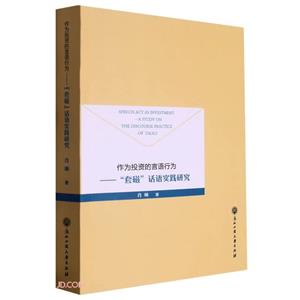-
>
妙相梵容
-
>
基立爾蒙文:蒙文
-
>
我的石頭記
-
>
心靈元氣社
-
>
女性生存戰爭
-
>
縣中的孩子 中國縣域教育生態
-
>
(精)人類的明天(八品)
作為投資的言語行為——套磁話語實踐研究 版權信息
- ISBN:9787517847625
- 條形碼:9787517847625 ; 978-7-5178-4762-5
- 裝幀:一般膠版紙
- 冊數:暫無
- 重量:暫無
- 所屬分類:>>
作為投資的言語行為——套磁話語實踐研究 內容簡介
本書考察了中國學生寫給國外導師爭取留學機會的“套磁”電郵。這里的“套磁”言語行為來源于本土,然而用于國際情境,是用英語交流的。它并無“巧舌如簧地與陌生人拉近關系”的貶義,而是一種中性的,既本土又全球,既古老而又新穎的語言構建或創造。作者帶著強烈的好奇心,帶領讀者去探索了這樣一個有趣的現象。作者借鑒社會學家布迪厄的場域、資本和慣習理論以及社會語言學家諾頓的二語投資概念,來分析中國留學申請者的“套磁”話語,將其解讀為全球文化資本的投資行為,并修訂了達文和諾頓(2015)的投資模型。這就豐厚和深化了言語行為意義的揭示,既細致生動又視野開闊。研究指出了話語及文化“慣習”的可重塑性、動態性。以往對于布迪厄理論的理解、闡釋和應用,多從社會結構主義的視角出發,強調結構關系和資本分配方式的再生產,突出其穩定的特性。
作為投資的言語行為——套磁話語實踐研究 目錄
1.1 The Motive
1.2 Taoci in Beijing Dialect
1.3 Taoci in the International Higher Education Market
1.3.1 Taoci Email
1.3.2 The Global Higher Education Market
1.3.3 Chinese Students in the Global Higher Education Market
1.3.4 Taoci as a Means to Hunt Global Education Offer
1.4 Summary
Chapter 2 Theoretical Framework and Relevant Work
2.1 Second Language Investment Theory
2.1.1 Bourdieu's Theory of Practice: Habitus, Field and Capital
2.1.2 Second Language Learning Investment
2.2 Speech Act Theory
2.2.1 Th Internalist Perspective: Intrinsic to Language Signs
2.2.2 The Externalist Perspective: Beyond Linguistic Signs
2.2.3 Performativity in Postmodern Sociology
2.3 L2 Learners' English Email Writing and Self-promotional Discourse
2.3.1 English Email from Student to Faculty
2.3.2 Self-promotional Genre in Application
2.4 Research Questions Based on the Present Work
Chapter 3 Research Methodology
3.1 Data Collection
3.1.1 Participants
3.1.2 Data CoUected
3.2 Data Analysis
3.2.1 Discourse Analysis Method of Taoci Email
3.2.2 Analysis Method of Interview Transcripts and Supplementary Data
3.3 Privacy Protection
Chapter 4 Investment Through Speech Acts: A Panorama
4.1 An Overview of Taoci as Macro Speech Act
4.2 Speech Act as Pulling Guanxi
4.2.1 Deference-oriented Strategy: Distancing
4.2.2 Solidarity-oriented Strategy: Bonding
4.2.3 Sectional Discussion: Investment with Social Capital
4.3 Speech Act as Promoting Self/2o
4.3.1 Me-oriented Strategy: Advertising Self
4.3.2 Us-oriented Strategy: Striking up Academic Bonding
4.3.3 Sectional Discussion: Investing with Academic Capital
4.4 Speech Act as Negotiating Entry
4.4.1 InquiringAvailabflity
4.4.2 Asking for Offer
4.4.3 Informing Application Status
4.4.4 Following up Application Status
4.4.5 Asking for "Illegitimate" Favor
4.4.6 Sectional Discussion: Investment for Imagined Identity
4.5 Discussion and Summary
Chapter 5 Writing to Act: An Individual Investment Trajectory
5.1 Case Data
5.2 Speech Act Varying Across Application Stages
5.2.1 The Door-knocking Phase: Overriding Self-promotion and Less Guanxi-pulling
5.2.2 The Upsetting Situation: More and Intensifying Guanxi-pulling
5.2.3 Deadline Approaching: More Accurate Self-promotion
5.2.4 Summary of Speech Act Variation Across Situations
5.3 Writing into an Imagined Future
5.3.1 Imagined IdentitY of "World Viewer" and "Successful Returnee
5.3.2 Accumulating Capital for Global Offer Hunting
5.3.3 The Dynamic Investment in Yunyang's Taoci
5.4 Summary
Chapter 6 The Dynamic Investment Model
6.1 General Discussion on Major Findings
6.2 The Dynamic Investment Model
6.2.1 Speech Act: Doing Investment with Words
6.2.2 Habitus: Perpetuating Yet Changing
6.2.3 Dynamism of Investment
Chapter 7 Conclusion
7.1 Implications
7.2 Limitations
7.3 Suggestions for Future Research
Appendixes
Appendix A English Translation of Participant Recruitment Email
Appendix B English Translation of the Interview Design
Appendix C Samples of Email Data in the Year of 2013, 2014 and 2015
References
作為投資的言語行為——套磁話語實踐研究 作者簡介
肖琳,現為江西財經大學外國語學院講師、碩士生導師,國際Cochrane協作網循證醫學志愿譯者,Cochrane漢化項目江西財經大學肖琳工作組組長。2016年畢業于北京大學外國語學院,取得文學博士學位,主要研究方向為社會語言學。2014年獲國家留學基金委資助赴美國紐約州立大學訪學。曾參與國家社科基金項目3項,主持省級課題2項、全國MTI研究生教育指導委員會教育研究項目l項,出版專著1部、譯著1部。
- >
上帝之肋:男人的真實旅程
- >
巴金-再思錄
- >
隨園食單
- >
小考拉的故事-套裝共3冊
- >
經典常談
- >
煙與鏡
- >
名家帶你讀魯迅:故事新編
- >
新文學天穹兩巨星--魯迅與胡適/紅燭學術叢書(紅燭學術叢書)
















